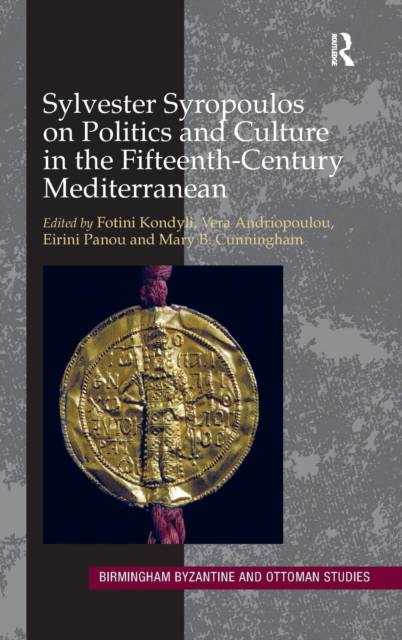
- Retrait gratuit dans votre magasin Club
- 7.000.000 titres dans notre catalogue
- Payer en toute sécurité
- Toujours un magasin près de chez vous
- Retrait gratuit dans votre magasin Club
- 7.000.000 titres dans notre catalogue
- Payer en toute sécurité
- Toujours un magasin près de chez vous
Sylvester Syropoulos on Politics and Culture in the Fifteenth-Century Mediterranean
Themes and Problems in the Memoirs, Section IV
290,45 €
+ 580 points
Description
The Memoirs of Sylvester Syropoulos is a text written by a Î'yzantine ecclesiastical official in the 15th century. Syropoulos participated in the Council for the union of the Greek and Latin Churches held in Ferrara and Florence, Italy, in 1438-1439. As a high-ranking official and an eye-witness of the union, he offers a unique perspective on this important political and religious event that would so decisively contribute to the political, military and religious development of Europe at the end of the Middle Ages. Experts in different fields - historians, philologists, art historians and archaeologists - have come together in this volume to explore the actions and motives of the various political and religious groups that participated in the council. With Syropoulos as their starting point, the contributors of this volume reconstruct the living conditions, cross-cultural interaction, artistic and commercial exchange in the 15th-century Mediterranean. At the same time, they discuss the text as an invaluable source for political and diplomatic affairs at that time, as a travel account, an eye-witness narrative and as a literary work. Emphasis is placed on Syropoulos's Section IV where he describes the journey of the Byzantine delegation from Constantinople to Italy, their stay in Venice and in Ferrara, the diplomatic contacts with the doge and the pope, and finally the beginning of the council's proceedings. An annotated English translation of the text is included as an appendix to the book. The papers bring out the richness of the information in Syropoulos's writings about the people involved in the Council of Ferrara-Florence and especially the interaction among different social, religious and political groups throughout that event. His work is unique because it is a rare eye-witness account, deriving from personal experience, rather than an objective historical narrative.
Spécifications
Parties prenantes
- Editeur:
Contenu
- Nombre de pages :
- 262
- Langue:
- Anglais
- Collection :
- Tome:
- n° 16
Caractéristiques
- EAN:
- 9781409439660
- Date de parution :
- 30-05-14
- Format:
- Livre relié
- Format numérique:
- Genaaid
- Dimensions :
- 156 mm x 234 mm
- Poids :
- 544 g






